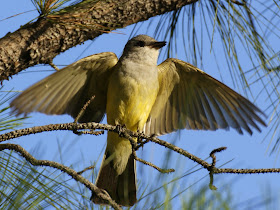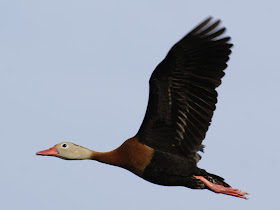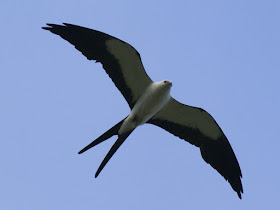.
When it comes to keeping an eye on nesting activity on the CyFair campus, my focus is usually on what our several pairs of Western Kingbirds are up to.
In this regard, one thing that has puzzled me this year has been that our oldest pair of Kingbirds hasn't nested under the roof of the basketball court. This is the first time this has happened since 2005. However, there may be a simple explanation. Northern Mockingbirds have built a nest in the gate of the basketball court and they're aggressively defending the area.
I first noticed the nest at the start of the week. Unfortunately, it is several feet above the level of my head and so I can't look into it. However, although I couldn't see any nestlings, there must be at least one because the parents keep bringing food.
Yesterday afternoon I finally managed to spot a nestling's beak poking up out of the nest.
So is this pair raising only one youngster?I waited a while and then tried taking some photos blind, with the camera held above my head and pointing in the direction of the nest. Most of the photos missed the nest but one didn't. If you look carefully, you can just see a second bird's head partly concealed by the vertical metal bar.
.
Jeff Mohamed blogs about birds and other wildlife in the Houston area - and occasionally farther afield.
Friday, June 28, 2013
Wednesday, June 26, 2013
Monday, June 24, 2013
Young Birds
.
All of our normal resident birds are visiting our feeders regularly. This includes the Brown-headed Nuthatches, which I have decided have now been here long enough to be classed as "residents". I haven't seen any evidence that the Nuthatches are breeding but this certainly isn't the case with our other yardbirds.
First to produce young this year were our Carolina Wrens, closely followed by our House Finches and House Sparrows. Then an immature Red-bellied Woodpecker made an appearance.
I don't normally notice whether our White-winged Doves are breeding. However, a couple of weeks ago I noticed that an adult was being begged from by what appeared to be a young bird.
Recently immature Northern Cardinals have started turning up at out feeders, too. One adult male seems to have assumed responsibility for bringing a youngster to our feeders. Any resemblance between the very dapper father and his offspring is not yet apparent!
.
All of our normal resident birds are visiting our feeders regularly. This includes the Brown-headed Nuthatches, which I have decided have now been here long enough to be classed as "residents". I haven't seen any evidence that the Nuthatches are breeding but this certainly isn't the case with our other yardbirds.
First to produce young this year were our Carolina Wrens, closely followed by our House Finches and House Sparrows. Then an immature Red-bellied Woodpecker made an appearance.
I don't normally notice whether our White-winged Doves are breeding. However, a couple of weeks ago I noticed that an adult was being begged from by what appeared to be a young bird.
.
Wednesday, June 19, 2013
Parking Lot Birding
.
At LSC-CyFair we work a 4-day week in the summer. This is great in many ways but it means those four days are very long and don’t include any time for birding the campus. Luckily, I still get to see quite a few birds just in the lot where I park every day.
Every day when I arrive at CyFair I spend a few minutes watching the Western Kingbirds that are nesting near my parking spot.
The female is spending quite a bit of time in the nest now.
The Kingbirds tend to be very tolerant of most other birds. They have no problems with the White-winged Doves or Mourning Doves (below) that perch in the tree that holds their nest.
Nor did they seem to mind the Common Nighthawk that decided to rest in an adjacent tree on Monday.
They're fine, too, with the Northern Mockingbird that has its own reserved perch nearby.
However, whenever Great-tailed Grackles approach the nesting tree, both Kingbirds swoop down on the Grackles again and again until they have driven them a safe distance away. I assume this means that there are now eggs in the nest.
The Grackles don’t seem to mind too much, though. They simply find another part of the parking lot in which to do their displays and to have their morning drinks.
At LSC-CyFair we work a 4-day week in the summer. This is great in many ways but it means those four days are very long and don’t include any time for birding the campus. Luckily, I still get to see quite a few birds just in the lot where I park every day.
Every day when I arrive at CyFair I spend a few minutes watching the Western Kingbirds that are nesting near my parking spot.
The female is spending quite a bit of time in the nest now.
The Kingbirds tend to be very tolerant of most other birds. They have no problems with the White-winged Doves or Mourning Doves (below) that perch in the tree that holds their nest.
Nor did they seem to mind the Common Nighthawk that decided to rest in an adjacent tree on Monday.
They're fine, too, with the Northern Mockingbird that has its own reserved perch nearby.
However, whenever Great-tailed Grackles approach the nesting tree, both Kingbirds swoop down on the Grackles again and again until they have driven them a safe distance away. I assume this means that there are now eggs in the nest.
The Grackles don’t seem to mind too much, though. They simply find another part of the parking lot in which to do their displays and to have their morning drinks.
.
Monday, June 17, 2013
Carpenter's Bayou
.
My visit to the Sheldon Lake nature center wasn't very productive. So after 30 minutes there I went back to Carpenter's Bayou (on the north side of Garrett Road).
I was worried that most of the birds might have moved on, but they hadn't. There were dozens of Great Egrets and at least ten Great Blue Herons.
There were several White Ibis grazing in the shallow water.
There were Little Blue and Tricolored Herons also.
However, the Spoonbills disappeared when I approached the side of the bridge.
My final birds at the bayou were some Black-bellied Whistling Ducks that flew overhead, whistling loudly as they went.
My visit to the Sheldon Lake nature center wasn't very productive. So after 30 minutes there I went back to Carpenter's Bayou (on the north side of Garrett Road).
I was worried that most of the birds might have moved on, but they hadn't. There were dozens of Great Egrets and at least ten Great Blue Herons.
There were several White Ibis grazing in the shallow water.
There were Little Blue and Tricolored Herons also.
Four Roseate Spoonbills were present.
I was delighted to see a solitary Wood Stork, a nice addition to my year list. Unfortunately, it was perched quite a distance away.
So I was pleased when it decided to fly off, giving me rather better looks.
.
Sunday, June 16, 2013
Sheldon Lake
.
Yesterday I drove over to the north edge of Sheldon Lake State Park to see what birds were there and in Carpenter's Bayou, just across Garrett Road from the park.
As soon as I got out of the car, I spotted a new year bird: Purple Gallinule.
I watched the Gallinule for a while as it wandered about, carefully lifting up the edges of lilypads as it went.
A few days earlier a Glossy Ibis had been reported from the same area and so I paid particular attention when a dark-colored Ibis appeared. It was difficult to get a good shot of the bird but the photos I did manage showed that it was indeed a Glossy Ibis, another new bird for 2013.
Nearby a Little Blue Heron was prowling in the shallow water.
A few yards further west, at the bridge, there was a group of Great and Snowy Egrets.
One of the Great Egrets stayed where it was.
The others flew up to the treetops, joining a White Ibis that was already perched well out of harm's way.
Although there were lots of herons and egrets on the Carpenter's Bayou side of the the bridge, I decided that I would wait to check these out until after I had paid a visit to the nature center area.
.
Yesterday I drove over to the north edge of Sheldon Lake State Park to see what birds were there and in Carpenter's Bayou, just across Garrett Road from the park.
As soon as I got out of the car, I spotted a new year bird: Purple Gallinule.
I watched the Gallinule for a while as it wandered about, carefully lifting up the edges of lilypads as it went.
A few days earlier a Glossy Ibis had been reported from the same area and so I paid particular attention when a dark-colored Ibis appeared. It was difficult to get a good shot of the bird but the photos I did manage showed that it was indeed a Glossy Ibis, another new bird for 2013.
Nearby a Little Blue Heron was prowling in the shallow water.
A few yards further west, at the bridge, there was a group of Great and Snowy Egrets.
One of the Great Egrets stayed where it was.
The others flew up to the treetops, joining a White Ibis that was already perched well out of harm's way.
Although there were lots of herons and egrets on the Carpenter's Bayou side of the the bridge, I decided that I would wait to check these out until after I had paid a visit to the nature center area.
.
Friday, June 14, 2013
Still here!
.
Last winter was a good one in our area for Red-breasted Nuthatches. As happens every few years, large numbers of these birds appeared in late October and stayed until May.
While I was pleased to see Red-breasted Nuthatches in our yards for several months, I was even more pleased when several Brown-headed Nuthatches turned up in early January. This was a new species for our yard, even though it is resident in Kleb Woods, just a few miles northwest of our house.
Now here we are in June and at least two Brown-headed Nuthatches are still visiting our feeders.
Last winter was a good one in our area for Red-breasted Nuthatches. As happens every few years, large numbers of these birds appeared in late October and stayed until May.
While I was pleased to see Red-breasted Nuthatches in our yards for several months, I was even more pleased when several Brown-headed Nuthatches turned up in early January. This was a new species for our yard, even though it is resident in Kleb Woods, just a few miles northwest of our house.
From January through April at least four Brown-headed Nuthatches spent parts of every day at our feeders. Then they disappeared and I assumed they had moved on.
But not so! I started seeing the occasional individual again in mid-May, usually at our peanut feeder.
Now here we are in June and at least two Brown-headed Nuthatches are still visiting our feeders.
I'm starting to think they may be nesting in our neighborhood. I certainly hope so because they really are delightful little birds.
.
Wednesday, June 12, 2013
An Uncommon Bird
.
Swallow-tailed Kites are exceptionally beautiful birds but unfortunately they are uncommon in our area. In fact, I have only ever seen one and that was years ago at High Island. So I was very excited to read a Texbirds postings that mentioned Swallow-tailed Kites were nesting in Crosby, which is east of Houston and less than an hour from our home.
Sunday morning I drove over there to look for the birds. Arriving on Aweigh Drive, I parked where the road crosses a flood ditch and I set off exploring the edges of the ditch. There were Great Egrets, a Snowy Egret, an Eastern Bluebird, a Red-headed Woodpecker, a Red-shouldered Hawk and several Black-bellied Whistling Ducks (below) but no Kites.
I waited, hoping that they would take off again and this time give me a chance to photograph them in flight.
Swallow-tailed Kites are exceptionally beautiful birds but unfortunately they are uncommon in our area. In fact, I have only ever seen one and that was years ago at High Island. So I was very excited to read a Texbirds postings that mentioned Swallow-tailed Kites were nesting in Crosby, which is east of Houston and less than an hour from our home.
Sunday morning I drove over there to look for the birds. Arriving on Aweigh Drive, I parked where the road crosses a flood ditch and I set off exploring the edges of the ditch. There were Great Egrets, a Snowy Egret, an Eastern Bluebird, a Red-headed Woodpecker, a Red-shouldered Hawk and several Black-bellied Whistling Ducks (below) but no Kites.
Then I glanced down the street and saw that several large, whitish birds were perched in a tree in front of one of the houses. I walked down towards the tree. Yes! The tree held no fewer than eight Swallow-tailed Kites!
A few minutes later the birds took off and flew across to the large flood ditch that runs parallel to and south of Aweigh Drive. They settled down in two different trees on the north side of the ditch.
I waited, hoping that they would take off again and this time give me a chance to photograph them in flight.
Five minutes later they launched into the air and circled over my head for several minutes. What a wonderful sight!
.





















































